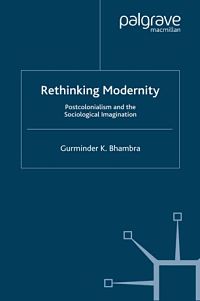Gurminder K. Bhambra on Postcolonial Social Science

“I grew up in this country,” says Gurminder K. Bhambra, a professor at the University of Sussex’s School of Global Studies, “and [yet] I always thought I was an immigrant. School told me I was an immigrant; the media told me I was immigrant; everything around me was that I was immigrant. When the Brexit debates were happening, I was talking to my dad about this. He keeps things, so he pulled out his old passports, my grandparents’ old passports, and all the passports were British.”
“So I’ve always been a British citizen, my parents have always been British citizens, and my grandparents have always been British citizens – not because we lived in Britain, but we lived in those parts of the world that were the British Empire at the time. Britain came to us, incorporated us within its polity, within its understanding. We were seen to be British, and yet when we traveled within the imperial polity and ended up in Britain, somehow we became migrants.”
This account and its summary – “people constructed their Britishness in opposition to me, as opposed to inclusive of me” – encapsulates Bhambra’s academic field: postcolonial and decolonial studies. In this Social Science Bites podcast, she discusses with interviewer David Edmonds why we should speak about the Haitian revolution in the same breath as the contemporaneous American and French revolutions, how former empires conveniently forget the contributions of their colonies now that those empires have downgraded to mere ‘nations,’ and what lessons we should draw from the current iconoclastic impulse toward imperial statuary. (Bhambra says she’s less focused on statues themselves than in “the histories that are embodied within them, and the extent to which people know and understand those histories and what it means for us, in the public sphere, to be defined by them.”)
Their talk begins with a quick primer of the origin of the complementary fields of post-colonialism and decoloniality. Each examines the legacy and lasting effects of European colonialism, but use different times and places as their starting points.
Postcolonialism emerged after the publication of its “keystone text” – Edward Said’s Orientalism – in 1978. “I don’t think Said necessarily thought that he was setting out to create a field when he wrote this book,” Bhambra explains. “But it was so influential – initially within English literature but then the humanities more generally – that it built up a body of scholarship in its wake that came to be understood as post-colonial studies.”
Initially, postcolonialism was interested in the interplay between the Middle East and South Asia and of Europe, generally starting around the 19th century.
Decoloniality, in contrast, initially explored Europe and Latin America and the Caribbean beginning with Columbus encountering the Americas.
As these fields expanded throughout the humanities and into areas such as historical sociology, scholars sought “what the place of the colonial was within their disciplines, find it missing, and seek to explain that absence.”
One absence that Bhambra herself explored in her own studies and her book Rethinking Modernity: Postcolonialism and the Sociological Imagination is how ‘the modern’ came to be seen as the province of Europe (and its North American domains) and their three revolutions, the American, French and Industrial. Her research quickly showed here that while sociologists might disagree on some particulars, they fully agreed that the modern world began with a dramatic break “between a pre-modern agrarian past and a modern industrial present, and that that temporal rupture could be located spatially within Europe, and that Europe (and North America is often encapsulated within this) marked a cultural separation from the rest of the world.”
That historical take is, she argues, a distortion. Modernity wasn’t manufactured in Manchester or drafted in a salon in Paris; it arose from existing colonial connections. “Modernity isn’t something that emerges endogenously and autonomously within Europe, from which it then spreads around the world. There were already global connections, and those connections were through processes of colonization, enslavement, imperialism, and so on. Those processes are the condition for things that we call modernity.”
The bill for that modernity, she adds, has yet to be paid in full.
“There is no institution in Britain or France to which colonial wealth has not contributed … anybody who has an historical connection to the empire has a right to the wealth and benefits of what is now the nation.”
To download an MP3 of this podcast, right-click HERE and save.
For a complete listing of past Social Science Bites podcasts, click HERE. You can follow Bites on Twitter @socialscibites and David Edmonds @DavidEdmonds100.




























































































Gurminder’s inciteful 25 minute talk about a sociological context to humanity’s story, centered on the colonist. If French/ American revolution rocks your boat, place them within a context of the Haitian Revolution! Another, the Industrial revolution in the context of British Imperial destruction of Indian silk and cotton textiles with imposition of very heavy duty on Indian goods.